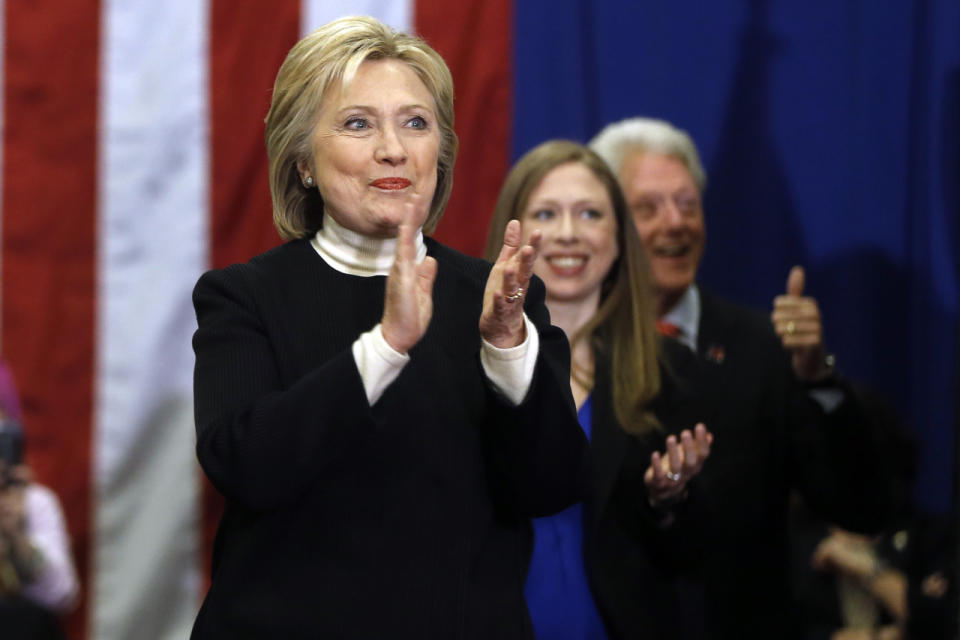Hillary Clinton’s campaign manager outlines why ‘March matters’ in strategy memo
Before the official results of the New Hampshire primary were announced Tuesday, Hillary Clinton’s campaign manager privately conceded her loss to Bernie Sanders in a memo to staff members.
“After splitting the first two contests, an outcome we’ve long anticipated, attention will inevitably focus on the next two of the ‘early four’ states: Nevada and South Carolina,” Robby Mook wrote in a three-page memo — titled “March matters” — obtained by PBS NewsHour. “We’ve built first-rate organizations in each state and we feel very good about our prospects for success. But at the same time as we are competing aggressively in Nevada and South Carolina, it’s important to understand why the campaign is investing so much time, energy and resources in states with primaries and caucuses in March. The reason is simple: while important, the first four states represent just 4% of the delegates needed to secure the nomination.”
SLIDESHOW – New Hampshire results are in >>>
The 28 states that vote or caucus in March, Mook noted, will award more than half (56 percent) of the delegates needed to win — and he believes the former secretary of state is well positioned to grab the bulk of them.

The Clintons take the stage in Hooksett, N.H., on Tuesday. (Photo: Matt Rourke/AP)
“Whereas the electorates in Iowa and New Hampshire are largely rural/suburban and predominantly white,” Mook continued, “the March states better reflect the true diversity of the Democratic Party and the nation — including large populations of voters who live in big cities and small towns, and voters with a much broader range of races and religions.
“The nomination will very likely be won in March, not February,” he added, “and we believe that Hillary Clinton is well positioned to build a strong – potentially insurmountable – delegate lead next month.”
More from Mook’s memo:
The March states represent an opportunity to build a coalition of support that’s as diverse as the Democratic Party itself. Hispanics and African Americans play a critical role in who we are as a party and who we are as a nation. Many of the most delegate-rich states also have some of the largest minority and urban populations – states like Texas, Georgia, Alabama, Illinois and Florida.

Bernie Sanders celebrates his primary victory over Clinton at a rally in Manchester, N.H., on Tuesday. (Photo: J. David Ake/AP)
Sanders’ win in New Hampshire was projected almost immediately after the polls closed. At the time of the publication of this article, the Vermont independent held a 21-point advantage on Clinton in the Granite State, with 69 percent of the votes counted.
But Sanders faces a tough battle in South Carolina, where a recent Wall Street Journal/NBC News poll showed Clinton with 74 percent support among African-American voters, compared to just 17 percent for the self-described democratic socialist.
On Wednesday morning, Sanders will travel to New York City, where he is expected to have breakfast with the Rev. Al Sharpton at a Harlem soul food restaurant.
According to Mook’s memo, the Clinton campaign will look to highlight Sanders’ differences with President Obama for black voters in the coming weeks:
Sen. Sanders will face increased pressure to explain his record – especially on issues where he deviates from President Obama, who remains exceedingly popular among Democrats in these states. Democrats in these states want to build on the progress made under President Obama. Thus, we expect Sen. Sanders’ positions and past votes on three of President Obama’s key priorities — gun safety, immigration reform and Obamacare — to cause significant problems for him in states with large African American and Hispanic populations. Additionally, as the campaign moves to states with a heavier presence of military personnel and veterans, Sen. Sanders should expect renewed questions about his foreign policy proposals and preparedness to be Commander-in-Chief.
Senator Sanders has unarguably tapped into real feelings of anger and frustration among voters. But what Hillary gets — and what she’s been fighting for her whole life — is the need to break down all the barriers that hold Americans back from living up to their own God-given potential, including systemic racism and discrimination. That’s how we’ll build a future we can all share.
Mook concluded: “We believe that Hillary’s unique level of strength among African Americans, Hispanics, women and working families of all backgrounds — combined with the most data-driven and targeted campaign ever waged — will net the delegates in March needed to put her on a clear path to the nomination.”
Below, the full strategy memo.


